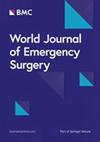A systematic review of the predictive factors for the recurrence of acute pancreatitis
IF 5.8
1区 医学
Q1 EMERGENCY MEDICINE
引用次数: 0
Abstract
Acute Pancreatitis (AP) is a prevalent clinical pancreatic disorder characterized by acute inflammation of the pancreas, frequently associated with biliary or alcoholic events. If not treated with cholecystectomy after the first episode, patients may experience a recurrence of AP, with consequent need for emergency surgery and increased risk of death. Analyzing the risk factors that may contribute to the recurrence of Biliary and Alcoholic Pancreatitis (BAP and AAP), future research can be driven toward new solutions for preventing and treating this pancreatic disease. A systematic review was conducted selecting studies from BiomedCentral, PubMed, Scopus and Web of Science by two independent reviewers. Publications were considered only if written in English in the time interval between January 2000 and June 2024 and investigated the risk factors for the recurrence of BAP and AAP. At the end of the selection, a quality assessment phase was conducted using the PROBAST tool. In this systematic review, 8 articles were selected out of 6.945, involving a total sample of 11.271 patients of which 38.77% developed recurrence episodes. 37.5% of the included studies focus on recurrent acute biliary pancreatitis (RBAP), while 62.5% are dedicated to recurrent acute alcoholic pancreatitis (RAAP). The risk factors for the recurrence of AP showed a clear differentiation between the alcoholic and biliary etiology. Most of the considered studies adopted a retrospective design, characterized by a susceptibility to potential methodological biases. However, the trend indicated a more recent increase in prospective studies, together with a greater focus on identifying and understanding the possible risk factors associated with the recurrence of acute pancreatitis (RAP). This result highlighted the progress in the scientific approach toward a more rigorous and systematic assessment of the causes and dynamics that influence the recurrence of the disease. Studies highlighted the importance of lifestyle factors, clinical complications, and surgical interventions that can impact the risk of biliary or alcoholic recurrent acute pancreatitis. Increased and systematic adoption of artificial intelligence-based tools could significantly impact future knowledge relating to the risks of recurrence and relative possibilities of prevention.急性胰腺炎复发预测因素的系统综述
急性胰腺炎(AP)是一种常见的临床胰腺疾病,以胰腺急性炎症为特征,常伴有胆道或酒精事件。如果在首次发作后不进行胆囊切除术,患者可能会经历AP复发,因此需要紧急手术,并增加死亡风险。分析可能导致胆汁性和酒精性胰腺炎(BAP和AAP)复发的危险因素,可以推动未来的研究为预防和治疗这种胰腺疾病提供新的解决方案。由两名独立审稿人对来自BiomedCentral、PubMed、Scopus和Web of Science的研究进行系统评价。仅考虑2000年1月至2024年6月期间以英文撰写的出版物,并调查BAP和AAP复发的危险因素。在选择结束时,使用PROBAST工具进行质量评估阶段。本系统综述从6.945篇文献中筛选出8篇,共涉及11.271例患者,其中38.77%的患者复发。37.5%的纳入研究集中于复发性急性胆源性胰腺炎(RBAP),而62.5%的研究集中于复发性急性酒精性胰腺炎(RAAP)。AP复发的危险因素显示酒精性和胆道性病因有明显的区别。大多数考虑的研究采用回顾性设计,其特点是对潜在的方法学偏差敏感。然而,这一趋势表明,最近前瞻性研究的增加,以及对识别和理解与急性胰腺炎(RAP)复发相关的可能危险因素的更多关注。这一结果突出了科学方法的进展,以更严格和系统地评估影响疾病复发的原因和动态。研究强调了生活方式因素、临床并发症和手术干预的重要性,这些因素可以影响胆道性或酒精性复发性急性胰腺炎的风险。更多和系统地采用基于人工智能的工具可能会显著影响与复发风险和相对预防可能性相关的未来知识。
本文章由计算机程序翻译,如有差异,请以英文原文为准。
求助全文
约1分钟内获得全文
求助全文
来源期刊

World Journal of Emergency Surgery
EMERGENCY MEDICINE-SURGERY
CiteScore
14.50
自引率
5.00%
发文量
60
审稿时长
10 weeks
期刊介绍:
The World Journal of Emergency Surgery is an open access, peer-reviewed journal covering all facets of clinical and basic research in traumatic and non-traumatic emergency surgery and related fields. Topics include emergency surgery, acute care surgery, trauma surgery, intensive care, trauma management, and resuscitation, among others.
 求助内容:
求助内容: 应助结果提醒方式:
应助结果提醒方式:


